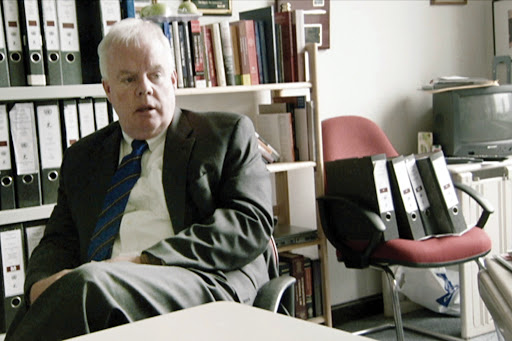World renowned international war crimes prosecutor and Penn State Dickinson Law School Professor Dermot Groome ’85 reunited with the BC Law community February 24 during a lecture hosted by the Owen M. Kupfershmid Holocaust/Human Rights Project (HHRP). Coloring the conversation with his experience leading the prosecution of Yugoslavian war crimes, Groome offered an array of statistics, photos, videos, and stories to help paint the picture of international crime prosecution of the past and present.
In his 11-plus years as a senior war crimes prosecutor at the International Criminal Tribunal for the Former Yugoslavia, Groome investigated and drafted the first genocide indictment against a sitting head of state, Slobodan Milošević, and was the senior trial attorney for the Bosnia indictment. In total, Groome led the prosecution of five international criminal trials, including the case against Ratko Mladić, who was convicted of genocide for the murder of over 7,000 men and boys in Srebrenica in 1995. He led eight large complex international investigations of senior military, political, and police officials, all of which included crimes of sexual violence against women, men, and children.
Groome’s extensive experience dealing firsthand with global atrocity crimes provides him with a clear view of the frequency and significance of such events, but the same cannot be said for those who aren’t involved in this type of work, said Groome. “We’ve become so accustomed to atrocity crimes being in the news that we forget how many there are and how significant these crimes are.”
Groome displayed information about some 20 cases of atrocity crimes, ranging from the ongoing conflict between Colombia and FARC rebels that began in 1998 to the more recent crimes against the Uyghur population in China (2014) and the Myanmar government’s campaign of persecution and genocide against the Rohingya minority (2016).
“If we are going to survive, we have to address the massive atrocity crimes that humans commit against humans.”
Dermot Groome ’80
Groome said, “The starting point for international justice is Nuremberg,” before offering the following quote from Justice Robert Jackson’s opening statement at the International Military Tribunal: “Civilization cannot tolerate their being ignored, because it cannot survive their being repeated.”
The importance here, noted Groome, is in Justice Jackson’s posing of international justice as an existential responsibility. “If we are going to survive, we have to address the massive atrocity crimes that humans commit against humans,” said Groome.
When assessing the current landscape of international justice, Groome brought up the 1995 case in Srebrenica alongside the 2009 case in Sri Lanka, highlighting the fall off of effective international response and accountability.
According to Groome’s figures, there were 78,000 victims in Srebrenica versus 37,000 in Sri Lanka. In the former, criminal investigation began immediately, while in the latter, there has been no investigation to date. Nearly all senior perpetrators of the crimes in Srebrenica have been investigated and convicted; conversely, all identified senior perpetrators of the Sri Lanka crimes continue to enjoy impunity and hold senior level positions in the Sri Lankan government.
One of the first things that happened in the Sri Lankan conflict was a breakdown of the legal system. “When persecutory crimes were committed, lawyers stopped doing what they were obligated to do as lawyers,” Groome said. “I think it’s a very important lesson for us, as lawyers, to be good prosecutors, good defense council and to always take our oath as lawyers seriously; to live it out in our daily work.”
One audience member noted that even in situations like Srebrenica, where the perpetrators were brought to justice, convictions alone can’t totally ameliorate the tensions and anger that still exist. “What is the role,” she asked, “of the international legal community in facilitating ongoing restoration and reconciliation toward that goal of maintaining peace and security?”
“I think that’s where we’ve fallen short,” said Groome. “When the security council created us, they thought that we would restore peace. People that I’m still in contact with there say tensions are still quite high. I think what we have contributed is the truth, and the people that ignored the truth and wanted to fight with each other back then are still alive and are still trying to do that.”
While much work is needed to be done to achieve adequate accountability and sustainable peace, Groome expressed optimism in the potential shown by his students and young lawyers in general. “I have great hope for people your age, young lawyers from the region, who study the judgments and go there for the truth,” said Groome.
He also offered inspiration to aspiring criminal lawyers who have questions about their capabilities as a result of subpar performances in the classroom.
“I teach criminal law now, and when the students get their grades, invariably, some of them come to me and say, ‘I want to be a prosecutor but I got such a lousy grade in your course,’ to which I tell them, my worst grade in law school was in criminal procedure with [BC Law Professor Robert] Bloom ’71 and it never stopped me from pursuing a career in criminal law,” said Groome. “Don’t let us professors in the time we spend reading an exam make you decide what you want to do.”
Hon. Philip Weiner ’80, former international war crimes judge at the Court of Bosnia and Herzegovina, chimed in during the question-and-answer session to express admiration for his fellow Law Eagle.
“We at BC should be very proud that one of the major war crime prosecutors in the world is a BC Law School alum. He never forgot the law school he came from; when we had lots of interns in the Hague, Dermot went out of his way to help the BC Law School interns,” said Weiner. “Dermot was not just an outstanding prosecutor, he is an outstanding person and we should be honored that he’s an alum from our school.”


